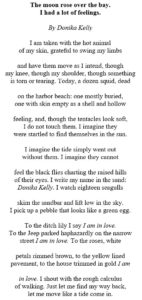I have a lot of feelings and always have. In fact, it’s why I began writing poems in high school. Feelings! So many feelings. Feelings that needed a safe place where they couldn’t taint the dinner table, soccer team, classroom, or band practice. You’d be bored if I told you how many feelings I had (and their particulars). But, to sum: Feelings about life’s meaning. About nonhuman beings. About love. About astronomy. About the crepuscular. About friends and family and…
Poetry was where feelings were permitted — nay, encouraged! — to run wild, to be excessive, to go over the top and beyond. When I looked to Walt Whitman, Audre Lorde, Sylvia Plath, Gerard Manley Hopkins, William Blake, and Ai — drama queens, one and all — I found that poems could be a place where big emotions are not tamped down, but honored, examined, and perhaps even exaggerated for glorious effect.
Yet feelings in and of themselves are not interesting (except in a rubbernecking, voyeuristic way) to anyone but the feeler, their therapist, and possibly their loved ones. Unless those feelings are honed and shaped.
Donika Kelly’s poem, the final in her second book, The Renunciations, is titled “The moon rose over the bay. I had a lot of feelings.” And it is anything but boring. In fact, it’s so compelling that I imagined that she had many poems by the same title — I was so sure! — but there’s just one. This one.

Kelly’s title is at once matter-of-fact and mysterious. A title with a period? A title that’s basically a CliffsNotes? A title with a moon? The moon is such a cliché that I’ve heard of creative writing teachers who have banned “the moon” from their workshops. Kelly pulls it off.
Kelly wrote this poem during a summer workshop at the Fine Arts Work Center with Gabrielle Calvocoressi (another poet I love). The inspiration she found in Provincetown’s harbor, streets, and thrumming spirit feels absolutely true, real, and vital. I love her poem’s dead squid and freeing wind and crowded streets. I love how a visitor can see this place anew and make me see it anew.
From the poem’s get-go, Kelly lets us in on her self-awareness (“I am taken”) and her imperfect body (knee, shoulder). Then she gives us those squid: awful and irresistible, a metaphor for the vulnerable self. Weird specifics follow: the name in sand, the “eighteen seagulls,” the rock. Why? These details are a pause in the poem that lets us gather breath for what follows.
“I am in love.” Ah. Here we have it. Love! Love transforms the dead squid, the flies, the ditch lily, and the Jeep into something beautiful and miraculous: Love. Love!
There’s a sense that Kelly could be describing anything (even the moon). What matters is how the newly-in-love self shifts all that is perceived into technicolor. The teller at the bank: beautiful! Oranges on sale at Stop & Shop: kismet! A parking space in August: fate, indeed, smiling upon you!
Then, where does the poem end? “Just let me find my way back,” Kelly writes. Back where? Back to the sane world where people don’t want to announce their emotional states to inanimate objects? I don’t believe it. This poem wants to honor madness, emotionality, big-heartedness. We find our way “back” to the tide, to a force that, as it comes in, will lift us whether we want to be lifted or not. What better metaphor for love could there be?



